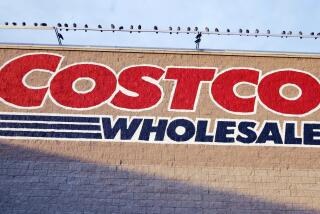SHOPPING : Snooping at the Checkout Line
- Share via
In Safeway’s radio ads in the Washington area, one customer raves that the grocery chain’s new “Savings Club” cut her food bill in half. Another says she used the savings for a trip to Florida.
The club, which offers discounts to shoppers in Safeway’s Eastern stores, is supposed to build customer loyalty, company officials say. But spokesman John Deckard acknowledges that it also allows the chain to collect dossiers on individual customers’ purchases.
And that information is a potential gold mine for manufacturers. Pepsi, for instance, has been building a list of Coke drinkers for years. Two years ago it delivered a million cases of soda to their houses in an effort to convert them.
Safeway so far says it will not sell its data to outsiders, although it may allow manufacturers to piggyback direct marketing appeals onto Safeway mailings.
Catalina Marketing Corp. of Florida has developed technology it calls “Direct Checkout.” Tommy Greer, chief executive officer, said this permits marketers to heap avalanches of promotional materials on consumers who are likely buyers, based on their purchases.
The program notes what a shopper buys and gives consumers targeted coupons at the checkout stand. If you buy one brand of cookies, for example, you may get a coupon for another brand with your receipt.
“In general, the trend for manufacturers and retailers is to want to do as much customer segmentation as possible,” said Marc Rotenberg of the Electronic Privacy Information Center, a private watchdog group on privacy issues. “The more information you have about customers, the more competitive and responsive you can be.”
A few years ago Kimberly-Clark, maker of Huggies disposable diapers, spent $3.5 million to develop a database that identifies 75% of new mothers in America through magazine subscriptions, child-care classes and hospital records.
Most large banks, credit card companies and credit bureaus, while reluctant to talk about their policies, insist that they do not sell the data to outsiders.
But many of their policies have been forged at the courthouse steps. The Federal Trade Commission forced TRW into an out-of-court settlement regarding its use of data. And only after being pressed by the New York state attorney general did American Express start notifying its cardholders that it sometimes profiles them based on their purchases and sells lists based on those profiles.
More to Read
Inside the business of entertainment
The Wide Shot brings you news, analysis and insights on everything from streaming wars to production — and what it all means for the future.
You may occasionally receive promotional content from the Los Angeles Times.










